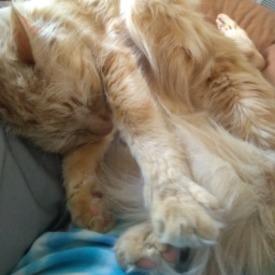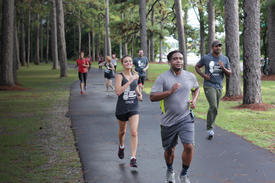Why do the more you do an exercise, the less calories it burns

BlaqueDiamond1989
Posts: 57 Member
I've always noticed that the more I do one exercise, the less calories it seems to burn. I know the more weight you lose, the less calories your body needs to perform certain exercises, but why burn less if you aren't losing weight. Sometimes I feel like I will spend my days exercising just to exercise. What's the point if I'm not losing anything? I can't extend my time in the gym any longer than I already do because of work and other responsibilities. I already work out six days a week, and I do yoga on Sunday's. I do two and a half hours on Monday's, Wednesday's, and Friday's, which include cardio and strength training. On Tuesdays, Thursdays, and Saturdays, I do an hour and a half of only cardio. Plus, I walk at least a mile and a half five days a week at work during breaks because I have a sit down job. Any feedback?
0
Replies
-
Are you weighing your food and logging it accurately?9
-

16 -
Consume less calories if your motivation is to lose weight.4
-
In addition to the need for accuracy with your food intake, how are you measuring your calorie burns? Gym machines notoriously over estimate the burn, as do many exercises in the MPF database. Some good advice is just to eat back 50% of your calorie burn and scale it from there.
5 -
Your body will get more efficient at exercises as you progress, that's your fitness improving.26
-
Yep, exercising is great for lots of reasons, including burning extra calories. But it can be really hard to nail down how many calories you are burning, and it's really easy to subtly overeat and compensate for the exercise if you aren't logging your food accurately and consistently. If you aren't losing weight, you are better off focusing on your diet as that's where the biggest bang for your buck will probably be!3
-
You need to eat less than you burn doing whatever you're doing, exercising, sitting at your desk, sleeping . Even just a little less for a slower weight loss. Not exercise more. So drop your intake a little, and the weight will fall off. It's the CICO rule, and it works.6
-
I'm going to follow up and say that you don't have to work out AT ALL to lose weight. Active exercise only accounts for 10-30% of our calories out but we control 100% of what we put INTO our bodies. You will hear a lot of people on here say that diet (verb) is for weight loss and exercise if for health. Many people on here don't exercise at all and still lose.
Also, how recently did you start all of this? If it's a new exercise program, you could be retaining water weight.15 -
BlaqueDiamond1989 wrote: »I've always noticed that the more I do one exercise, the less calories it seems to burn. I know the more weight you lose, the less calories your body needs to perform certain exercises, but why burn less if you aren't losing weight. Sometimes I feel like I will spend my days exercising just to exercise. What's the point if I'm not losing anything? I can't extend my time in the gym any longer than I already do because of work and other responsibilities. I already work out six days a week, and I do yoga on Sunday's. I do two and a half hours on Monday's, Wednesday's, and Friday's, which include cardio and strength training. On Tuesdays, Thursdays, and Saturdays, I do an hour and a half of only cardio. Plus, I walk at least a mile and a half five days a week at work during breaks because I have a sit down job. Any feedback?
you seem focused on exercise to lose weight but make no mention of how much you are eating or a calorie deficit??4 -
Our bodies are adaptable. As we do the same activity over and over it becomes more efficient at doing it and so needs less calories to do it.
Increasing length, resistance or intensity can increase the calorie burn Or switching to a different exercise that requires different movements and muscles.
The reason to do exercise even if it doesn't cause weight loss is for your health. Exercise reduces the risk of many diseases, including but not limited to heart disease, stroke, cancers, diabetes, osteoporosis...13 -
A few things come to mind...
- You burn fewer cals (assuming everything else remains constant) as you get better at an exercise because your body becomes more efficient at doing that exercise. While true, I doubt this is the limiting factor for most MFPers.
- How are you tracking cals burned? There are so many factors that can impact calorie estimates - I'm betting it is something related to the measuring, not the actual burning, that's changing (at least in any meaningful/significant way).
- If weight loss is your goal, focus more on your diet/intake and less on exercise as the reason/method for losing weight. Exercise certainly helps and plays a role in weight loss, but it's a fairly small role.
7 -
I don't think it's generally true that you burn fewer calories the more you exercise. Instead, if your fitness is improving, you should be able to burn MORE calories in the same time. For example, if you aren't fit, you might start with running 4 miles/hour and improve to 7 miles in the same hour, and end up burning way more calories. Same with swimming or cycling or spinning. Even with something like Zumba you will in theory be exercising more vigorously, and you will be able to lift heavier weights for strength training.
A HRM may show that your HR is less at the same speed and distance, but that's why a HRM isn't necessarily reliable to count calories if you start when quite unfit.13 -
lemurcat12 wrote: »I don't think it's generally true that you burn fewer calories the more you exercise. Instead, if your fitness is improving, you should be able to burn MORE calories in the same time. For example, if you aren't fit, you might start with running 4 miles/hour and improve to 7 miles in the same hour, and end up burning way more calories. Same with swimming or cycling or spinning. Even with something like Zumba you will in theory be exercising more vigorously, and you will be able to lift heavier weights for strength training.
A HRM may show that your HR is less at the same speed and distance, but that's why a HRM isn't necessarily reliable to count calories if you start when quite unfit.
This exactly, MFP ate my post as I was writing it with many more details.
3 190 lb men who run for 30 minutes may run 1.9/3.2/4.5 miles in that 30 minutes. The one who runs 4.5 is going to burn more than twice what the one who runs 1.9 miles burns. That being around 500 vs 250.
That being said, if you're losing weight, you're going to weigh less and be putting less load on, so It's certainly possible that when the 190 lb man has been at it for 6 months and gets to a 9 minute mile that he may only weigh 170.
For those wondering, I've been using these 190 lb men for years, the fast one is about 6 ft tall, the slow one is about 5'3" and the middle guy is about 5'8"5 -
Most people as they get fitter and stronger gain the ability to burn more calories not less.
That may be offset to a degree in weight bearing exercises as you are moving less mass - but in reality people get faster and go further rather than do the exact same exercise as when they were fatter and less fit.
My main exercise is non-weight bearing (cycling) so my body weight is far less important than my fitness and endurance. My maximal calorie burns for same duration are up about 30% since getting very fit despite weighing 30lbs less.
Strength training calorie burns are in relation to how much weight you move not how much your body weighs - stronger you are the bigger the potential burn.
It's one of the failings of heart rate monitors being used for calorie estimates that people think they are burning less whereas in fact their heart is pumping more efficiently as they get fitter.
Feedback - remember weight loss is primarily driven by diet not exercise.4 -
I think its not that you have to work out harder or longer but rather look to cut calories in the kitchen if losing weight is still a goal.
The calories burned will not change significantly but as you have lost weight, your daily needs have probably diminished to the point where what you are presently doing is maintenance. If you cant work harder or longer, you have to find a different way to tip the formula in your advantage.0 -
I measure my calorie use on a bike with a power meter, which gives a maximum error of 5% for calories.
They more time I spend on the bike, the more calories I burn. Very clear relationship. A 4 hour ride always burns more than a 3 hour ride.
The better I get at cycling, the more calories I'm able to burn, and the faster I can burn them.
Those are facts, and anybody can verify them independently.2 -
Possibly adaptation try mixing up and changing what you do to see if that can help.7
-
it would probably be better use of your time to do exercises that were not so time consuming as you say you are spending hours working out. If you normally walk X miles, then you can still go the same distance...but every 5 minutes try to jog for 30 seconds or a minute, etc. You will be done faster and using these intervals will help build up your cardiovascular system.
if the work you are doing doesn't get your heart pumping like it used to then it's time to step it up. If you are on a tredmill or elliptical you need to increase the incline or resistance or speed to get more of a workout. It's no different that needing to lift heavier weights over time.0 -
It's simple math. fewer calories can cause you to not gain as much, maintain or lose weight depending on the amount of deficit. Exercise can increase the burn (deficit) or give you some room to eat more. If you are gaining or not losing you are going to have to change something, fewer calories in or more exercise to burn them. Sometimes you have to say if I am not logging calories or exercise correctly so be it but you will still need to reduce or be more accurate.0
-
I greatly appreciate all the feedback that you guys have given. I did not mention my calorie in-take above, but I try to only consume 1,200 to 1,300 calories a day. I do track my food in-take by using MFP, and I track my fitness by using my Apple watch and MFP. MFP has my calory in-take of 1,430 in order for me to get down to my goal weight. Sometimes I am full from just 1,200 calories a day, so I don't eat more than that. I don't want to eat when I'm not hungry, so I don't go by the MFP calory in-take that much.1
-
BlaqueDiamond1989 wrote: »I greatly appreciate all the feedback that you guys have given. I did not mention my calorie in-take above, but I try to only consume 1,200 to 1,300 calories a day. I do track my food in-take by using MFP, and I track my fitness by using my Apple watch and MFP. MFP has my calory in-take of 1,430 in order for me to get down to my goal weight. Sometimes I am full from just 1,200 calories a day, so I don't eat more than that. I don't want to eat when I'm not hungry, so I don't go by the MFP calory in-take that much.
Hey Bianca! You're really on track to succeed here! Just a quick thing, though. How are you counting your calories? Are you using measuring cups or actual weights? I know that it seems like a tedious extra step, but I think you might be surprised about the huge discrepancy between weights and volume measurements (like cups). Amazon has a number of highly rated talking scale, and even one that pairs with Alexa, if you have one.2 -
How much weight have you lost?
A 200 lb woman doing an exercise is going to burn more calories than a 140 lb same height woman doing the same exercise and same intensity.BlaqueDiamond1989 wrote: »I greatly appreciate all the feedback that you guys have given. I did not mention my calorie in-take above, but I try to only consume 1,200 to 1,300 calories a day. I do track my food in-take by using MFP, and I track my fitness by using my Apple watch and MFP. MFP has my calory in-take of 1,430 in order for me to get down to my goal weight. Sometimes I am full from just 1,200 calories a day, so I don't eat more than that. I don't want to eat when I'm not hungry, so I don't go by the MFP calory in-take that much.
Is that your net calories or your total calories eaten?
If you're only eating a total of 1200 calories with all that exercise, you may be risking serious health problems.
Are you eating back most of your exercise calories earned?1 -
How are you measuring that reduction in calories burned? While it’s true that we get more efficient as we practice exercise (and thus burn fewer calories), and that smaller bodies require fewer calories to move, those changes happen really slowly. That’s not a change that should be impacting your day-to-day burns or intake, unless you’re talking about a difference over a long period of time or after a significant reduction in weight.2
-
You don’t fewer calories as you become more fit or more “efficient”. Your fitness tracker or HRM becomes more inaccurate. Efficiency does occur, but it has only a modest effect and is irrelevant for most people.
Your heart rate and perceived exertion become less at the same workload, but that does not affect calories burned. Calorie burn is determined by the workload, not the effort per se.
And whatever small effect that efficiency does have is easily offset by........just working harder—which you should be able to do because.....you have become more efficient. There is no law, state or federal, that prevents someone from exercising at a higher workload as their fitness level improves.
6 -
Weight loss is definitely determined in the kitchen. May need to examine the type of food being eaten, and how it's prepared. The best thing that helped me with weight loss was to have a weekly meal and exercise plan and tracking them consistently and family participation.0
-
Here is some reasons that your scale didn't move.
1. If you started to exercise more just recently, it could be just your body retained more fluid and you'll see a drop when your body is used to the new intensity of excercise.
2. You could gained more muscle weight and balanced out the fat loss, have your checked your waist or arm, did your cloth fit better?
3. How accurate is your logging? Try weight your food if you want more accurate data. If you really is consuming 1200 to 1300 a day and didn't eat back any excercise calorie, your should see a very fast weight drop because you have a huge deficit
1 -
Something just doesn't add up for me. Eating only 1,200 calories while excercising 6 days a week and walking a lot? How are you not passing out or dizzy at the gym?
How long have you done this and what is your age, height, and weight?3 -
You don’t fewer calories as you become more fit or more “efficient”. Your fitness tracker or HRM becomes more inaccurate. Efficiency does occur, but it has only a modest effect and is irrelevant for most people.
Your heart rate and perceived exertion become less at the same workload, but that does not affect calories burned. Calorie burn is determined by the workload, not the effort per se.
And whatever small effect that efficiency does have is easily offset by........just working harder—which you should be able to do because.....you have become more efficient. There is no law, state or federal, that prevents someone from exercising at a higher workload as their fitness level improves.
This whole post, 100% endorsed. I agree with the theory (and @Azdak is way more experienced and knowledgeable than I, regardless ).
).
And I've seen it in practice.
My rowing machine knows what my work is: The same meters, at the same power, in the same time period = the same work, and the same actual calories required.
My heart rate monitor is not so bright. When I get fitter or stronger, my heart labors less to do the same work, so my HRM thinks I've burned fewer calories doing that same work It's wrong. 3
3 -
I didn't read all of the responses, so forgive any redundancy. Don't think about the actual calorie output, but rather, about how your body feels. Basically, you are burning fewer calories because your body is using less energy to perform the activity.
Think about how you felt after your first workout and how you feel after a workout today. Maybe you sweat less and you're breathing easier. Maybe you don't have as much post workout tension. Maybe you're finding that activities that used to be difficult are super easy today. For example, you say you practice yoga once a week. Perhaps you struggled to get into Vakrasana (half spinal twist) in the beginning, but now, you use Ardha Matsyendrasana (more complex version of Vakrasana) as one of your go-to resting post workout stretches (when you're checking your phone or talking to a workout buddy). So, even if the numbers don't seem encouraging, you're definitely making progress.
If you're really worried about the numbers, try mixing it up. Switch your cardio workout around. If you're using machines, increase the level of difficulty. If you're taking aerobics classes, switch to a danced based class (like Hip-Hop or Zumba). In your yoga practice, try some of the advanced modifications for the asanas (only after you've perfected your form - you don't want to hurt yourself).
Remember, your journey is not about weight and measurements, it's about achieving/maintaining optimal health.
7 -
Beyond a couple of very accurate posts about it not actually being the fact you burn less the more you do a workout - I'll throw in an idea.
With the amount of workouts you are doing, and if accurate with the amount of calories you are eating - I'll bet the reason it appears you burn less is because your workouts have really started sucking and becoming mediocre.
As others mentioned it appears the sole reason for your workouts is weight loss, rather than the body transformation it should be.
But since you seem to be doing everything to make recovery from workouts suck, it naturally follows the workouts themselves will start being not what they could be, nor what they used to be.
Meaning less calorie burn.
I'll bet your body has also adapted max it can for rest of your day, and despite step/distance goals, probably less active than you think.
While in that state of poor workouts, it doesn't feel like it generally - still feels like giving it your all, still feels hard, still feel tired, ect.
But until you compare it with how it feels not in that state - you'd never realize it.
Considering cardio and lifting has efficiency in form improvements when starting out, that should make it feel easier doing the same intensity/weight, to make it feel the same with proper recovery intensity/weight should be improving. and that initial improvement doesn't even require the body improving and getting stronger yet.
Is your cardio measurable for performance - getting better/faster, ect?
Is the weight in lifting going up from the form and strength improvements?4
This discussion has been closed.
Categories
- All Categories
- 1.4M Health, Wellness and Goals
- 398.1K Introduce Yourself
- 44.7K Getting Started
- 261K Health and Weight Loss
- 176.4K Food and Nutrition
- 47.7K Recipes
- 233K Fitness and Exercise
- 462 Sleep, Mindfulness and Overall Wellness
- 6.5K Goal: Maintaining Weight
- 8.7K Goal: Gaining Weight and Body Building
- 153.5K Motivation and Support
- 8.4K Challenges
- 1.4K Debate Club
- 96.5K Chit-Chat
- 2.6K Fun and Games
- 4.8K MyFitnessPal Information
- 12 News and Announcements
- 21 MyFitnessPal Academy
- 1.5K Feature Suggestions and Ideas
- 3.2K MyFitnessPal Tech Support Questions





















